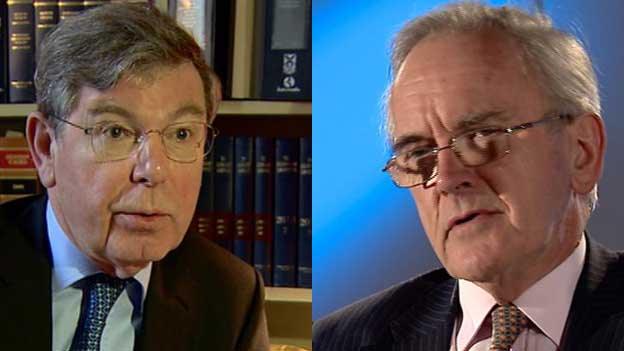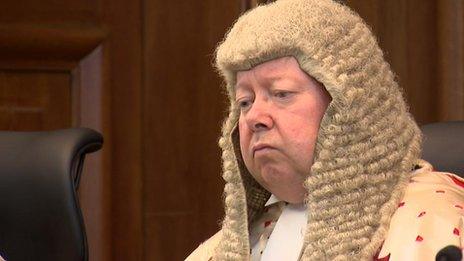Plans to abolish corroboration in Scottish cases dropped
- Published
Plans to ditch corroboration had been put on hold while the review took place
Controversial proposals to abolish the requirement for corroboration in criminal cases are to be dropped by the Scottish government.
It follows a review which recommended the need for two sources of evidence in criminal cases should be retained in certain circumstances.
Justice Secretary Michael Matheson confirmed the measure would not be included in the Criminal Justice Bill.
He said the government needed more time to consider the findings.
The plans to end corroboration were brought forward by Mr Matheson's predecessor Kenny MacAskill, who had said the "outdated rule" meant many victims were denied justice.
Ministers believe more rape, sexual offence and domestic abuse cases would be heard in court if the current need for two different and independent sources of evidence was removed.
The reform has been backed by police and prosecutors but there was fierce opposition from the legal profession, who raised concerns of an increased risk of miscarriages of justice.
The measure was part of the Criminal Justice (Scotland) Bill, which has already been passed in principle by MSPs.
Mr Matheson said he was removing the proposal from the bill, while also deleting a related measure to increase jury majorities.
Recommendations
The move came after a review by Lord Bonomy said corroboration should still apply to evidence obtained by hearsay and confession.
The review also recommended:
judges should have greater scope to throw out cases
increasing jury majorities from eight to 10.
an end to dock identification
police interviews with suspects should always be recorded
Mr Matheson said there was still a case for abolishing corroboration, which should be considered as part of a wider review after the 2016 Holyrood election.
In a statement to the Scottish Parliament, Mr Matheson said he wanted to build a consensus on a package of proposals for criminal justice reform.
He said: "Given this approach, I do not consider there is sufficient time to complete this work before the Criminal Justice (Scotland) Bill resumes its parliamentary passage.
"On that basis, it is clear to me that proceeding with the removal of the corroboration requirement in that Bill would be neither appropriate nor feasible.
"The Bill should proceed with amendments to remove corroboration provisions from the Bill, and also to remove the related increase in the jury majority required for conviction.
"Removing the corroboration provisions from the Criminal Justice Bill will allow the other provisions in the Bill to go forward as soon as parliamentary timetables permit."
Policy shift
Labour, the Conservatives and the Liberal Democrats have all welcomed the major policy shift by the Scottish government.
The move has also been backed by legal bodies.
Alistair Morris, president of the Law Society of Scotland, said: "We strongly welcome the Cabinet Secretary's announcement.
"We consistently stated that the proposal to remove the corroboration requirement in criminal proceedings should be subject to a full review.
"We also expressed concern about the speed of the process in our response to Lord Bonomy's review consultation. Deferring this until the next parliamentary session will allow for further consideration of this complex area of law and further scrutiny of necessary safeguards within criminal proceedings."
Meanwhile, a spokesman for the Faculty of Advocates said the issues raised by the Bonomy Report were of "crucial importance" and required more consideration.
Rape Crisis Scotland's Sandy Brindley, who campaigned for corroboration to be abolished, also supported the decision.
She said: "It's probably a good thing that they are going to take some time to properly look at the implications.
"In particular, it would not have been a good thing if the size of the minimum jury majority had been increased without the not proven verdict being abolished.
"This could have led to a reduction in the number of rape convictions."
- Published21 April 2015

- Published4 February 2014

- Published7 January 2014

- Published7 January 2014
